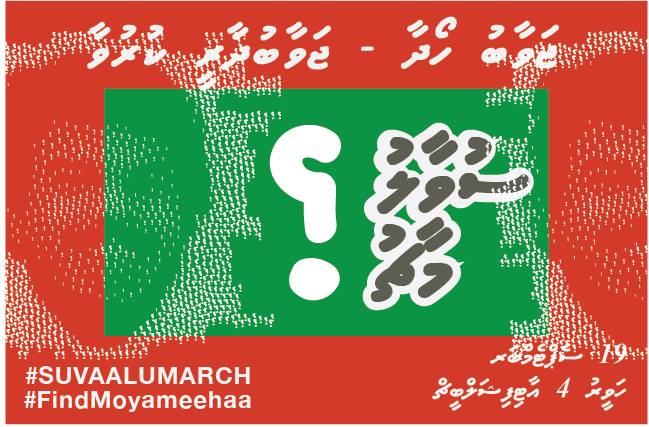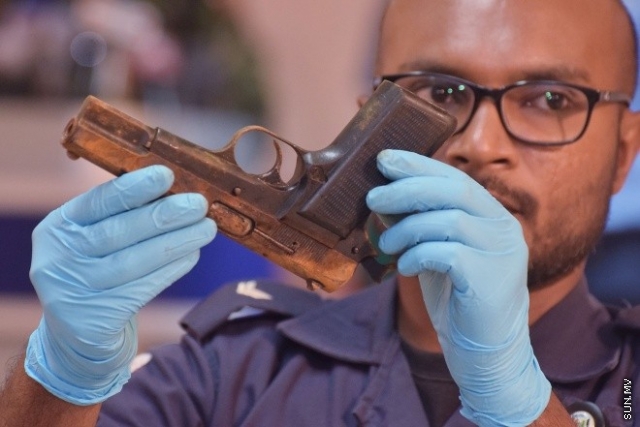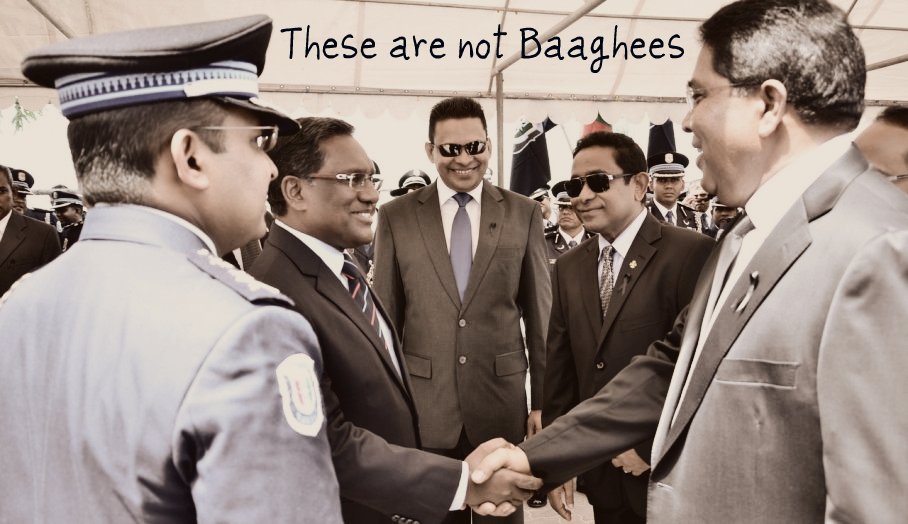
42 days and 15 hours since Rizwan (also known as Rilwan), a young man in his twenties, disappeared without trace from the small island of Hulhumale’. Despite some factual inaccuracies elsewhere in the article, the UK’s Independent newspaper was right on target when it described Rizwan’s disappearance as an illustration of a darker, less seen Maldives. It is now very clear to anyone in the Maldives with a thinking mind that either top-level people in the government, the security forces, or both, have a hand in Rizwan’s disappearance.
On the night Rizwan was last seen, two witnesses came forward to say, they saw a man being forced into a red car at knife-point from outside Rizwan’s apartment. They immediately contacted the police who arrived on the scene, took notes—even recovered a fallen knife—and went off on their merry way. Despite the eye-witnesses, police said on Tuesday this week (after 39 days) that there is no connection between Rizwan’s disappearance and the abduction from outside his apartment on the night of his disappearance. It beggars belief that the police cannot even tell us who, if not Rizwan, was kidnapped in the middle of the night from Hulhumale’. No one else’s family has come forward to report a missing person.
If not Rizwan, who was abducted from outside his apartment? Where is Rizwan? How can a Maldivian disappear without trace from a small island? Why are the police spreading disinformation? Why are they trying to plant rumors that the abducted person was a female? Why are they trying to deceive? Who is behind Rizwan’s disappearance? If police cannot answer any questions related to the disappearance of a law-abiding peaceful citizen with no history of violence or criminal activity, what is their purpose? Who is the Maldives Police Service (MPS) ‘protecting and serving’ if not citizens?
There have been many previous examples of police incompetency or complicity in major crimes. On all such occasions there are combined religious/political motives—or, as Minivan News put it—‘an unholy alliance’—of radicals and violent gangs (often sponsored by the state) behind them.
In June 2012 Hilath Rasheed the first (and still only) openly gay Maldivian blogger advocating for LGBT rights was brutally attacked near his home. His throat was slit from side to side causing the neck to open like a widely yawning mouth. Seeing the gaping hole, a nurse at the hospital fainted.
“No one thought I would make it,” Hilath said. I met him in Sri Lanka a month after the attack. His voice was still gruff, like it every word he spoke was an attack on his vocal cords. His hands shook, and he kept turning around to double-check he was not being attacked from behind. “They wanted to kill me,” Hilath said looking me in the eye. His shock was still palpable many painful weeks after the attack. CCTV footage exists of the attackers approaching him from both sides in the lane-way to his family home in Male’ in the early evening shadows. Hilath was certain he gave, and police collected, enough evidence to identify who the attackers were. Yet, there has been ‘no progress’ in the investigation. Hilath, who feared for his life, sought shelter elsewhere. The police took it as an opportunity to say they could not continue the investigation as the victim was not there to pursue the matter further. As if an attempted murder is merely a crime against an individual and not the entire society itself. Hilath has, understandably, chosen to remain in exile rather than seek answers or battle for justice in the Maldives—it is a place where questions remain unanswered, crimes remain unsolved and justice remains undelivered.
Before that, in January 2011, was the attack against Aishath Velezinee, then a member of the Judicial Service Commission (JSC). She was stabbed in the back in broad daylight. Hilath spoke out for gay rights; Velezinee spoke out against judicial wrongdoing and crimes against the State and Constitution. The man who stabbed her aimed for her spine—paralysis could easily have been the outcome. It was a narrow miss.
The police, after weeks of ‘investigation’, identified someone as the attacker. But it was, if they were right, so clearly the hired would-be assassin rather than the persons (or forces) behind the attack that Velezinee insisted the police dig deeper and find the person who commissioned the attack. They did not. In the end, the police did not pursue even the culprit they had themselves identified. Once again it was ignored that grievous bodily harm or attempted murder are crimes against society to be pursued by the public prosecutor on behalf of the people of Maldives rather than a dispute between two individuals that can be ignored if the parties involved are not pursuing each other.
The most brutal case—so far—has been that of MP Dr Afrasheem Ali who was hacked to death on 2 October 2012 at the foot of the stairs leading up to his apartment. At the risk of sounding like the late blogger Dr Haulath who conjured up ‘evidence’ and anonymous sources to make wild allegations against people, I will recount what I have been told by a wholly reliable—yet necessarily anonymous source—who was until recently privy to national intelligence: Dr Afrasheem was murdered by hired foreign mercenaries. Those who commissioned his murder are now in top positions in government. Dr Afrasheem offended some; he was also standing in some people’s way of political progress; his religious views offended some others. For many powerful people, Dr Afrasheem was better dead than alive. He was right in the middle of the ‘unholy alliance’ between corrupt politicians, religious extremists and ‘born-again’ gang-members. The clean-up afterwards involved millions spent on silencing the family, the murder of a Bangladeshi expatriate who knew too much, and speedy dispatch of the murderers back to their own countries. With this investigation—unlike the attacks on Hilath and Velezinee—the police put up a pretence of investigating. When the US offered to help with by donating services of the FBI, there was no choice but to accept. Reports from inside say the FBI team with so much obstruction and obfuscation from within the MPS they left in disgust. So far, the truth remains totally hidden.
President Abdulla Yameen who heads the current government has many allegations of corruption against him that date back years. This includes the alleged wrongful acquisition of US$800 million when he was in charge of the State Trading Organisation (STO) during his half-brother Maumoon Abdul Gayoom’s 30-year dictatorship. Nothing has ever been proven against him, of course, which is the reason for—and the end result of—his power. Yameen became president partly by successfully cultivating deep ties with ‘the youth’—the substantial percentage, anyway, of whom that are involved in the narcotics trade and gang-violence. Despite having run for presidency on a youth ticket, he was callously unconcerned with the news that Rilwan had disappeared from Hulhumale’. Rizwan was a youth taken without trace from the island the ‘youth President’ intended to develop into a dedicated ‘Youth City.’
Days later the very president, who had ‘No Comment’ about Rizwan because—in his words, not mine: a President cannot comment about ‘anything and everything’—was happy to order the police to stop taking down the ‘huts’ or ‘shelters’ that Male’ gangs use in various areas of the island city to congregate and plan their various nefarious activities from. Not one word, though, has President Yameen had to spare to comfort Rizwan’s grieving family, his persistent friends who persevere in seeking answers, and the shocked people of Male’ city and its ‘suburb’ of Hulhumale’. Not a single word. It is a silence that speaks volumes. It is a silence which has given the police license to ignore Rizwan’s disappearance, unlike the gangs and their huts. ‘We will stop taking down the [gang] huts because the President has said so,’ the police said.
Are the police failing to investigate Rizwan’s disappearance because the President has not ordered such an investigation personally? Is that what it takes to instigate a police investigation in this so-called ‘democracy’? Under the leadership of Yameen, are the functions of the security forces so arranged that unless he gives a direct order no crime can be investigated?
Once again today, friends and family of Rizwan—like every Friday since his disappearance—are out trying to keep his disappearance in public consciousness. This is a Herculean task in a society held captive by materialism and is in thrall to money. It is nigh on impossible in a society where a general decline in civil values, morals and principles are increasingly hidden behind a veil of claimed religiosity. For each Maldivian shocked by the fact that a young man who has never caused any living person—or creature—any harm can be made to disappear without a trace from a small island with a population of just thousands, there are three who could not care less or are willing to denigrate Rizwan for not sharing their puritan principles or narrow-minded worldview.
The case of Rizwan is, like Azim Zahir said yesterday, also about the future of the Maldives. If we do not want it to be a society of people who care not where their money come from as long as it lines their own pockets; who care not about injustice as long as they (and their own) are free; who care not if there is no security in society as long as they (and their own) come to no harm; who mind not about the disappearance of a young man as long as he is not their child, brother, husband or friend then we must all look for Rizwan.
If we do not want to lose ourselves, we must all come together and make sure the authorities #FindMoyameehaa.


